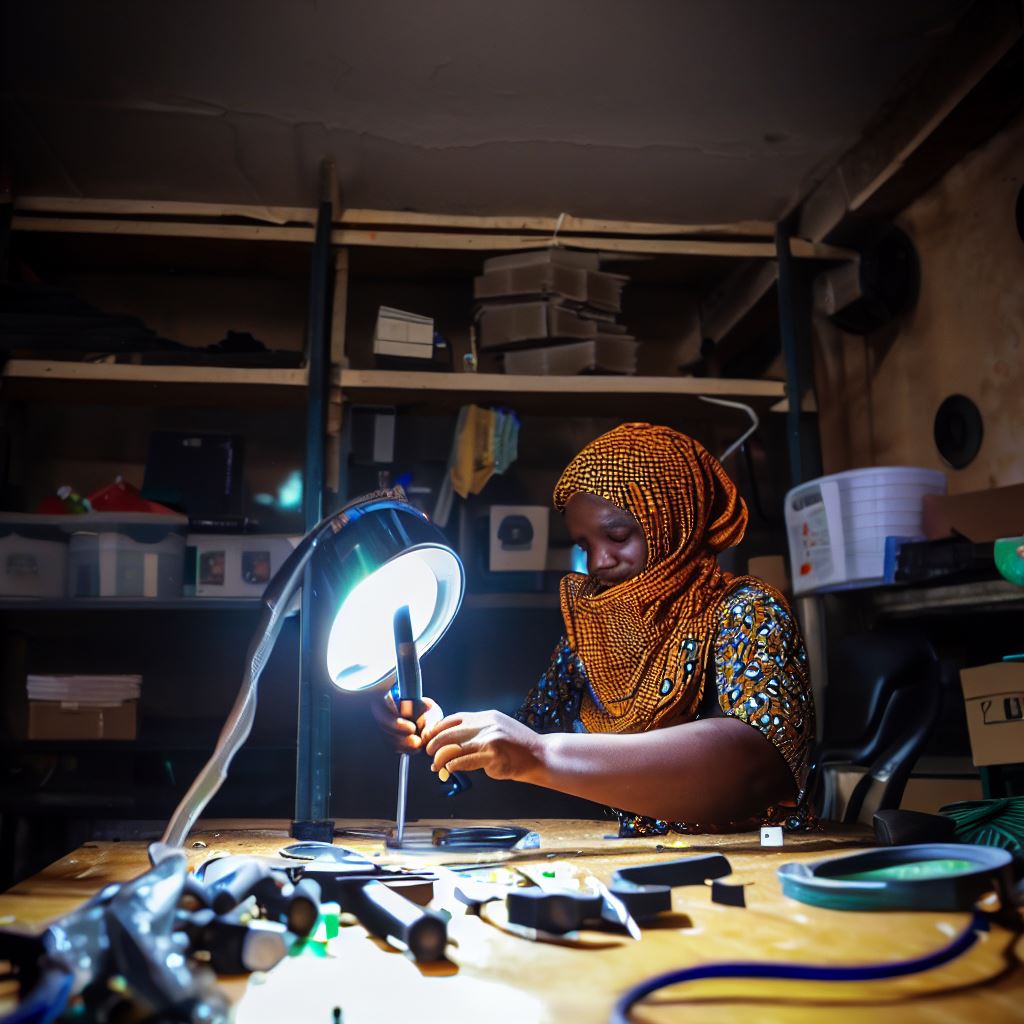Introduction
In Nigeria, the field of lighting technology is undergoing a transformative evolution, and at the heart of this evolution lies a burgeoning avenue of opportunities for women.
As the nation propels itself towards technological advancements and sustainable development, there is an increasing recognition of the invaluable contributions that women can make in this domain.
This shift is not merely a reflection of inclusivity, but a strategic move to harness the diverse perspectives and innovative potential that women bring to the table.
In a rapidly advancing society, it is crucial to highlight the potential for women to empower themselves and contribute to this innovative industry.
As we delve into this topic, we aim to captivate your interest and emphasize the significance of this growing field for women in Nigeria.
In this context, it is imperative to delve into the multifaceted opportunities that await women in the dynamic realm of lighting technology within Nigeria.
This narrative unravels a compelling journey of empowerment, skill development, and professional growth, ultimately illuminating the path for women to play a pivotal role in shaping the future of lighting technology in the nation.
Welcome to an exploration of the exciting opportunities available for women in the field of lighting technology in Nigeria.
Current Scenario of Lighting Technology in Nigeria
Here we will discuss the current state of lighting technology in Nigeria and highlight the growth and potential of the sector, while also mentioning any gender disparities or underrepresentation in the field.
Current State of Lighting Technology in Nigeria
Nigeria, as the most populous country in Africa, experiences significant energy challenges, particularly in the area of lighting technology.
The majority of the population lacks access to reliable and efficient lighting solutions.
The country heavily relies on traditional sources of lighting such as kerosene lamps, candles, or inefficient incandescent bulbs.
This leads to several issues, including health hazards, safety concerns, and high energy consumption.
The Growth and Potential of the Lighting Technology Sector
Despite the challenges, the lighting technology sector in Nigeria has been experiencing steady growth.
The Nigerian government and various stakeholders have recognized the need for sustainable lighting solutions.
The introduction of LED technology has been a game-changer in the lighting industry, offering energy-efficient, long-lasting, and environmentally friendly alternatives.
This technology has the potential to revolutionize lighting in Nigeria.
The demand for lighting products and solutions has been increasing, driven by rapid urbanization, infrastructure development, and a rising middle class.
This presents significant opportunities for women to enter and excel in the lighting technology sector.
Gender Disparities and Underrepresentation
Unfortunately, like in many other industries, the lighting technology sector in Nigeria also faces gender disparities and underrepresentation of women.
Women are often overlooked or discouraged from pursuing careers in science, technology, engineering, and mathematics (STEM) fields.
This gender bias limits the pool of talented women contributing to the advancement of lighting technology.
However, the situation is gradually changing as initiatives and organizations are promoting gender equality and empowering women in STEM.
More women are now entering the field and making significant contributions to lighting technology in Nigeria.
The current scenario of lighting technology in Nigeria presents both challenges and opportunities.
While traditional lighting solutions still dominate, the growth potential of the sector combined with the rising demand for sustainable lighting creates a promising environment.
However, gender disparities and underrepresentation of women persist in the field.
Efforts should be made to encourage and support more women to pursue careers in lighting technology, as their contributions are essential for the industry’s advancement.
By promoting gender equality and providing equal opportunities, Nigeria can harness the full potential of its female talent pool and pave the way for a more diverse and innovative lighting technology sector.
Read: Networking Opportunities for Lighting Technicians in Nigeria
Challenges Faced by Women in Lighting Technology
When it comes to opportunities for women in lighting technology in Nigeria, there are several challenges that they often encounter.
These obstacles and barriers hinder their entry into the field and limit their progress.
Obstacles and Barriers
- Lack of representation: Women face a significant lack of representation in the lighting technology field in Nigeria.
- Glass ceiling: There is an invisible barrier that prevents women from reaching higher positions in the industry.
- Stereotypes and biases: Preconceived notions about women’s abilities in technical fields create hurdles for aspiring female professionals.
- Gender discrimination: Women are often subjected to unfair treatment and biases, making it difficult for them to thrive.
- Work-life balance: Balancing professional and personal responsibilities can be a challenge for women in this field.
Societal, Cultural, and Traditional Factors
- Patriarchal society: Nigeria’s society is deeply rooted in patriarchal values, which limits opportunities for women.
- Cultural expectations: Traditional gender roles assign women to domestic duties rather than technical professions.
- Limited mobility: Societal norms restrict women’s mobility, making it harder for them to access job opportunities.
- Perception of risk: Families may discourage women from pursuing careers in lighting technology due to safety concerns.
- Lack of support networks: Absence of support systems and mentorship programs for women hinders their professional growth.
Limited Access to Education and Skills Development
- Gender disparity in education: Girls often have limited access to quality education, depriving them of technical skills.
- Stereotyping in STEM: Girls are not encouraged to pursue science, technology, engineering, and mathematics subjects.
- Access to resources: Women from marginalized communities face additional challenges in accessing education and training.
- Skills development opportunities: Limited availability of training programs directly affects women’s progress in the industry.
- Financial constraints: Lack of financial resources prevents women from obtaining necessary certifications and qualifications.
These challenges collectively create a hostile environment for women in lighting technology in Nigeria.
Overcoming these obstacles requires targeted efforts from both the government and the industry.
Promoting diversity, implementing policies to counter gender discrimination, and providing scholarships and mentorship programs can help address these issues.
Moreover, tackling societal and cultural norms through awareness campaigns and educational initiatives is crucial.
Encouraging girls to pursue STEM subjects from an early age and providing equal access to resources will empower aspiring women in lighting technology.
In fact, the challenges faced by women in lighting technology in Nigeria are multifaceted.
By addressing these obstacles, the industry can tap into a significant pool of untapped talent and contribute to a more gender-inclusive workforce.
Read: The Importance of Lighting Technicians in Nigerian Events
Initiatives and Programs Supporting Women in Lighting Technology
In Nigeria, there are several initiatives, organizations, and programs that aim to support women in the lighting technology field.
These initiatives have specific objectives and activities to empower women and provide opportunities for them to excel.
Women in Science and Technology in Nigeria (WISTIN)
- Objective: WISTIN aims to increase the representation of women in science and technology fields, including lighting technology.
- Activities: WISTIN organizes mentoring programs, workshops, and conferences to provide networking and skill-building opportunities for women. They also offer scholarships and grants to support women pursuing careers in lighting technology.
- Success Stories: One notable achievement of WISTIN is the establishment of a mentoring program that has facilitated the career growth of many women in the lighting technology industry. Several mentees have gone on to become leaders and innovators in their respective fields.
Women in Energy Network (WIEN)
- Objective: WIEN aims to bridge the gender gap in the energy sector, including lighting technology, by creating a supportive community for women.
- Activities: WIEN organizes regular meet-ups, training sessions, and webinars on lighting technology. They also collaborate with industry partners to provide internships and job placement opportunities for women.
- Success Stories: WIEN has successfully connected many women with job opportunities in the lighting technology field. Through their networking events and partnerships, women have been able to showcase their skills and secure positions in top lighting technology companies.
SHE-CAN Initiative
- Objective: The SHE-CAN Initiative aims to empower and inspire women to pursue careers in male-dominated fields, including lighting technology.
- Activities: SHE-CAN Initiative conducts workshops, seminars, and training programs to equip women with the necessary skills and knowledge in lighting technology. They also offer mentorship and career counseling services.
- Success Stories: Many women who have benefited from the SHE-CAN Initiative have successfully transitioned into the lighting technology field. They have become renowned experts, contributing to the sector’s growth and innovation.
Girls Code Nigeria
- Objective: Girls Code Nigeria focuses on empowering young girls through coding and technology education, including lighting technology.
- Activities: Girls Code Nigeria organizes coding boot camps, hackathons, and workshops that introduce girls to various technology fields, including lighting technology. They also offer scholarships and internships.
- Success Stories: Girls Code Nigeria has seen many of its participants pursue careers in lighting technology and excel in their chosen paths. These young women have been recognized for their innovative projects and contributions to the industry.
These initiatives, organizations, and programs are just a few examples of the support available for women in the lighting technology field in Nigeria.
Through their various objectives and activities, they are helping women overcome barriers, gain skills, and thrive in this traditionally male-dominated industry.
The success stories and notable achievements serve as an inspiration for aspiring women in lighting technology to embrace opportunities and reach their full potential.
Read: The Importance of Lighting Technicians in Nigerian Events

Success Stories of Women in Lighting Technology
In Nigeria, there are inspiring stories of women who have made significant contributions in the lighting technology sector.
These women have not only excelled in their careers but have also made a positive impact in their communities and nationally.
Here are a few success stories:
Adaobi Nwaokorie
Adaobi Nwaokorie is a renowned lighting designer who has led innovative projects in Nigeria.
Her work involves using lighting to create visually captivating environments in public spaces.
She has won several awards for her creativity and contributions to the field.
Funmilayo Ogunbiyi
Funmilayo Ogunbiyi, an electrical engineer, has played a vital role in bringing solar-powered lighting solutions to rural communities in Nigeria.
Her efforts have not only improved the quality of life for residents but have also reduced dependence on traditional energy sources.
Ifeoma Anekwe
Ifeoma Anekwe is a prominent entrepreneur in the lighting technology sector.
She founded a company that specializes in manufacturing energy-efficient LED lights.
Her products have gained popularity due to their affordability and environmental friendliness.
Ngozi Nweze
Ngozi Nweze is a woman of many talents.
As a lighting consultant, she has worked on numerous projects, including the design of lighting systems in commercial buildings and public spaces.
Her expertise and attention to detail have earned her recognition and respect in the industry.
Bukola Ibrahim
Bukola Ibrahim is a trailblazer in the field of lighting technology.
She was the first woman in Nigeria to establish a lighting technology company focused on providing sustainable lighting solutions for households and businesses.
Her company has since expanded and created job opportunities for many.
Chika Okonkwo
Chika Okonkwo is a lighting engineer who has been at the forefront of implementing energy-efficient lighting projects in Nigeria.
Her work has helped organizations reduce their energy consumption and promote sustainability.
She has also mentored aspiring women in the field, encouraging them to pursue careers in lighting technology.
Amina Abdullahi
Amina Abdullahi is a lighting designer known for her innovative approach to creating lighting installations.
Her projects have been recognized for their aesthetically pleasing designs and ability to enhance the atmosphere of various settings.
She continues to inspire others with her creativity and passion.
Toyin Ogunnubi
Toyin Ogunnubi is an influential figure in the lighting technology industry.
She founded a nonprofit organization that provides solar-powered lighting solutions to underserved communities in Nigeria.
Her initiative has positively impacted the lives of many and has raised awareness about the importance of sustainable energy sources.
These success stories highlight the accomplishments, innovative projects, and leadership roles women have undertaken in the lighting technology sector in Nigeria.
Not only have they excelled in their respective fields, but they have also made a significant impact in their communities and on a national level.
Their contributions serve as an inspiration for aspiring women in lighting technology, emphasizing the opportunities available and the positive change that can be achieved.
Read: Case Studies: Successful Lighting Technicians in Nigeria
Overcoming Challenges and Paving the Way for Equality
Breaking Gender Stereotypes and Fostering Diversity
Gender stereotypes limit opportunities for women in lighting technology.
By challenging these stereotypes, we can create a more equal playing field.
Diverse teams bring fresh perspectives and innovative solutions to the field.
Encouraging more women to enter the field will enhance diversity and creativity.
Equality in the lighting technology industry benefits everyone by maximizing talent and ideas.
Strategies and Recommendations to Overcome Challenges
Advocate for equal representation and inclusion of women in lighting technology.
Create networking opportunities and platforms for women in the industry to connect and support each other.
Offer mentorship programs to provide guidance and support for women entering the field.
Establish scholarships and grants specifically for women pursuing education in lighting technology.
Encourage companies to implement diversity and inclusion initiatives.
The Role of Education, Mentorship, and Industry Collaborations
Educational institutions need to provide equal access and resources for women in lighting technology.
Offer courses and programs that specifically address the challenges faced by women in the field.
Mentors play a crucial role in guiding and empowering women in their careers.
Industry collaborations can offer internships, apprenticeships, and skill-building opportunities for women.
Partnerships between academia and the industry can create a supportive ecosystem for women in lighting technology.
Creating Equal Opportunities
Addressing gender inequality requires collective efforts from individuals, organizations, and society as a whole.
Challenging biases and stereotypes is essential for creating equal opportunities for women.
By promoting inclusivity and diversity, we can reshape the culture of the lighting technology industry.
Recognize and celebrate the achievements and contributions of women in the field.
Continued advocacy and awareness campaigns are necessary to sustain progress towards gender equality.
In essence, breaking gender stereotypes and fostering diversity are crucial steps towards providing equal opportunities for women in lighting technology in Nigeria.
By implementing strategies such as advocating for equal representation, offering mentorship programs, and promoting industry collaborations, we can overcome the challenges faced by women in this field.
Education plays a vital role in creating equal opportunities, and partnerships between academia and the industry can help pave the way for a more inclusive ecosystem.
It is through collective efforts that we can create a future where women in lighting technology have the same chances for success as their male counterparts.
Future Prospects and Opportunities
In recent years, the lighting technology sector in Nigeria has experienced significant growth and advancements.
As the country continues to develop, the demand for sustainable and energy-efficient lighting solutions is on the rise.
This presents numerous opportunities for women to excel in various areas within the industry.
Potential Growth and Advancements
The lighting technology sector in Nigeria is poised for future growth and advancements.
New technologies and innovations are constantly being introduced to improve lighting efficiency and functionality.
With the government’s focus on infrastructure development, the demand for lighting solutions is expected to increase.
This growth opens doors for women to explore career opportunities and contribute to the sector’s expansion.
Increasing Demand for Sustainable Lighting Solutions
The demand for sustainable and energy-efficient lighting solutions is rapidly increasing.
Nigeria, like many other countries, is embracing the importance of environmental conservation.
As a result, there is a growing emphasis on adopting lighting technologies that reduce energy consumption and carbon footprint.
Women can play a crucial role in the development and implementation of such solutions.
Opportunities for Women in Smart Lighting
Smart lighting is an emerging field with vast potential in Nigeria.
This technology integrates sensors, connectivity, and automation to enhance lighting control and efficiency.
Women can take advantage of opportunities in smart lighting design, installation, and maintenance.
By embracing this niche, women can become pioneers in transforming how Nigeria illuminates its spaces.
Exploring Renewable Energy Sector
Renewable energy, including solar and wind, is gaining traction in Nigeria.
With its abundance of sunlight, the country is well-suited for solar lighting solutions.
Women can actively participate in the renewable energy sector by specializing in solar-powered lighting systems.
They can contribute to designing and deploying sustainable lighting options that rely on renewable sources.
Research and Development Opportunities
Research and development play a critical role in driving innovation in lighting technology.
Women can pursue careers in research, exploring new materials and techniques for better lighting solutions.
By engaging in research and development, women can work towards making lighting technology more accessible and affordable.
Nigeria needs talented individuals to conduct studies that address unique lighting challenges within different regions.
The future prospects for women in the lighting technology sector in Nigeria are promising.
The growth and advancements in the industry, combined with the increasing demand for sustainable lighting solutions, create a fertile ground for women to excel.
By exploring areas such as smart lighting, renewable energy, and research and development, women can carve out their niche and contribute to shaping the future of lighting technology in Nigeria.
Conclusion
This blog post highlighted the opportunities available for women in lighting technology in Nigeria.
Throughout the post, we discussed the need for women’s involvement and contributions in this field.
By reiterating the significance of women’s involvement and contributions, we emphasized the positive impact they can have in shaping the lighting technology industry in Nigeria.
Encouraging women to pursue these opportunities and showcase their talents is crucial for the field’s growth.
Women in Nigeria have immense potential to excel in lighting technology, and it is essential to create an environment that supports and empowers them.
By actively participating and contributing in this field, women can drive innovation and bring a fresh perspective to the industry.
To ensure women’s success in the lighting technology field, it is crucial to provide mentorship programs, networking opportunities, and resources that support their professional development.
By breaking barriers and challenging stereotypes, women can become leaders and change-makers in this industry.
In a nutshell, women in Nigeria have immense opportunities in lighting technology.
Their involvement and contributions are vital for the field’s growth and development.
Let us encourage women to pursue their dreams, showcase their talents, and make a significant impact in the lighting technology industry in Nigeria.




